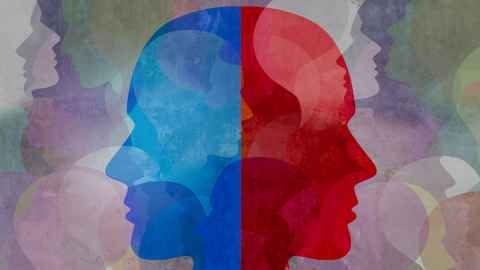The insidious politics of mental illness
24 March 2023
Questioning the mental health system and labels given to various conditions by psychiatrists is the focus of a special issue of New Zealand Sociology.

If knowledge and treatment for mental disorders like depression have been improving, why are people getting sicker?
This central conundrum, observed in the late 1990s by American medical journalist Robert Whitaker, was one of the starting points for a special issue of New Zealand Sociology, edited by sociologist Bruce Cohen, an associate professor from the University of Auckland.
Antisocial personality disorder, major depressive disorder, and the medicalisation of homosexuality are just some of the subjects covered in the Theorising Mental Health, special issue (2023) which features seven main articles, all written and researched by Faculty of Arts’ honours students in sociology and criminology.
As part of a sub-branch of sociology called critical mental health, Dr Cohen says the articles collectively question the mental health system and labels given by psychiatrists to conditions like autism, gender dysphoria and ADHD, which are now so often taken for granted that even questioning them is frowned upon.
“I don’t think that would have been the case 30 or 40 years ago, but with the expansion of these labels, and the ideas on mental health that have proliferated over that time, it now seems incredibly controversial.”
He says what the issue is doing is simply “good sociology”.
“With this ‘medicalisation’ of everyday life, even with something as mundane as male baldness or shyness, we’re looking at who benefits, who has the power to define such things as ‘disease’ and who doesn’t. If a diagnostic classification isn’t a valid disorder, then we should all be asking what purpose it serves."

What their research is not doing is questioning people’s individual experiences of those conditions, he says.
“But we are certainly questioning what the point of psychiatry and mental health system is. The key problem for psychiatry in the seventies remains the same issue today, namely that psychiatrists don't often agree on what mental illness someone has or even if they have a disorder at all.”
Arin Hectors’ article, for example, he says, critically reflects on the 50 years since the American Psychiatric Association (APA) removed the diagnosis of ‘homosexuality’ from the second edition of its bible, the Diagnostic and Statistical Manual of Mental Disorders (DSM).
“Arin is arguing that despite the APA voting homosexuality out of the DSM in 1973, they have continued to pathologise gay, queer, trans and other gender diverse groups in subsequent editions. There has not been a lot of change; psychiatry is continuing to police sexuality and gender roles.”
Dr Cohen says some of the top psychiatrists will readily agree that they're the ultimate arbiters of social behaviour in society.
“When you think that something like homosexuality used to be (and still is in some places) criminalised by society as a form of social deviance, now there is much greater social acceptance.
“So you had gay rights activists and others knocking on the door of the APA in the seventies saying, ‘We can't have this as a mental disorder anymore’, but now it’s been replaced, argues Arin, by other mental disorders like ‘transvestite disorder’, which is in the current DSM-5 manual.”
The key problem for psychiatry in the seventies remains the same issue today, namely that psychiatrists don't often agree on what mental illness someone has or even if they have a disorder at all.
Three of the seven articles are concerned with gender diversity, and one looks at the medicalisation of unemployment.
“If you’re unemployed in the 21st century,” says Dr Cohen, “the problem becomes you rather than the economic and political variants of capitalist society. There is now considered to be something wrong with your attitude to work and you’re offered (sometimes forced into) therapy sessions at the job centre as part of your ‘re-training’.
"Work is theorised as always good for your mental health, though the research certainly does not back that up.”
Most of the articles look back at the history of psychiatry, something that if you talk to a psychiatrist, they often know little about, he says.
“And they know even less about the history of specific diagnoses, and that's a really fruitful area for sociologists. We call this critical interrogation of the past a 'social historical analysis'.”
Dr Cohen says there are identifiable trends from analysing medical history which help people understand the political purposes of psychiatry, including the labelling of the suffragettes with ‘hysteria’, runaway slaves as suffering from ‘drapetomania’ (defined as an ‘uncontrollable or insane impulsion to wander’), and unruly young people in schools with ADHD.
There has not been a lot of change; psychiatry is continuing to police sexuality and gender roles.
“As Virginia Lambert writes in her article on ‘gender dysphoria’ (a current DSM-5 diagnosis), hysteria was one of several historical labels the mental health system used against women who were demanding the vote and freedom from their suffocating domestic roles in the early twentieth century.
“At the time, psychiatrists gaslit them as being mentally disturbed. Many scholars argue that ‘borderline personality disorder’ in the DSM-5 serves a similar purpose for women who choose to prioritise paid work above responsibilities in the home.”
The behaviour and emotions which are socially sanctioned today have become narrower and narrower, Dr Cohen believes.'
“The scholars in this issue focus their analysis on the norms and values in wider society and how these are reflected in the DSM, and what psychiatry now counts as either ‘normal’ behaviour, or behaviour that requires a medical label.”
Current Issue | New Zealand Sociology (nzsociology.nz) is open access and out now.
Media contact
Julianne Evans | Senior media adviser
M: 027 562 5868
E: julianne.evans@auckland.ac.nz